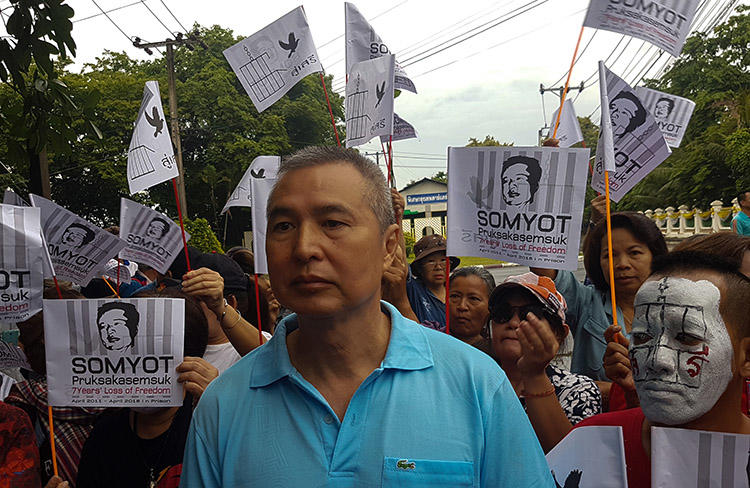News editor Somyot Prueksakasemsuk was released from Bangkok Remand Prison in the Thai capital on April 30, 2018 after serving a sentence for lèse majesté, according to news reports. Reports said that Somyot was greeted by a small group of family and supporters and appeared to be in good spirits.
Somyot, who was editor of the now closed Voice of Taksin, told reporters upon his release that Thailand’s junta had led the country “backward” and he was “disappointed” that democracy had not yet been restored, reports said.
Because Somyot served his full sentence no conditions were placed on his release, according to a source who is familiar with the situation and who spoke with CPJ on condition of anonymity due to the sensitivity of royal issues in Thailand.
The editor was first arrested on April 30, 2011 at a Thai border checkpoint while trying to cross into neighboring Cambodia, according to CPJ research. In 2013, he was sentenced to 10 years in prison for two news articles that appeared in Voice of Taksin, the local language news magazine he edited, that judges deemed were insulting to the Thai monarchy, and an additional year for defamation of a senior security official.
The Supreme Court reduced his lèse majesté sentence to six years in February 2017 on the grounds that he did not write the articles in question, according to reports.
Convictions under Thailand’s lèse majesté law, outlined in article 112 of the criminal code, carry maximum 15-year jail sentences. CPJ has found that the law’s harsh provisions lead to widespread self-censorship among journalists when reporting on royal issues.
Days before his arrest, Somyot started a petition to pressure parliament into removing Article 112 from the criminal code, according to news reports. Somyot was denied bail on at least 16 separate occasions while in detention, according to reports.
Thailand’s long-ruling King Bhumibol Adulyadej died in October 2016 and his heir-apparent Vajiralongkorn Bodindradebayavarangkun has since succeeded him to the throne.
Any Thai individual may file lèse majesté charges under the law. Members of the Thai royal family have never personally filed defamation charges.
Somyot’s wife and son, both of whom campaigned for his unconditional release, were briefly detained on May 24, 2014, two days after the military seized power in a coup, according to press reports. Military authorities confiscated two of their laptop computers, but no charges were filed, according to reports.
